Reading Greek TEXT AND VOCABULARY SECOND EDITION First published in 1978, Reading Greek has become a best-selling one-year introductory course in ancient Greek for students and adults. It combines the best of modern and traditional language-learning techniques and is used widely in schools, summer schools and universities across the world. It has also been translated into several foreign languages. This volume contains a narrative adapted entirely from ancient authors, including Herodotus, Euripides, Aristophanes and Demosthenes, in order to encourage students rapidly to develop their reading skills. Generous support is provided with vocabulary. At the same time, through the texts and numerous illustrations, students will receive a good introduction to Greek culture, and especially that of Classical Athens.
The accompanying Grammar and Exercises volume provides full grammatical support together with numerous exercises at different levels, GreekEnglish and EnglishGreek vocabularies, a substantial reference grammar and language surveys. THE JOINT ASSOCIATION OF CLASSICAL TEACHERS GREEK COURSE
Reading Greek
TEXT AND VOCABULARY SECOND EDITION

CAMBRIDGE UNIVERSITY PRESS
Cambridge, New York, Melbourne, Madrid, Cape Town,
Singapore, So Paulo, Delhi, Mexico City Cambridge University Press
The Edinburgh Building, Cambridge CB2 8RU, UK Published in the United States of America by Cambridge University Press, New York www.cambridge.org
Information on this title: www.cambridge.org/9780521698511 The Joint Association of Classical Teachers Greek Course 1978, 2007 This publication is in copyright. Subject to statutory exception and to the provisions of relevant collective licensing agreements, no reproduction of any part may take place without the written permission of Cambridge University Press. First edition published 1978
Twenty-seventh reprint 2007
Second edition published 2007 Printed and bound in the United Kingdom by the MPG Books Group
A catalogue record for this book is available from the British Library ISBN 978-0-521-69851-1 Paperback Cambridge University Press has no responsibility for the persistence or accuracy of URLs for external or third-party internet websites referred to in this publication, and does not guarantee that any content on such websites is, or will remain, accurate or appropriate.
Contents
Foreword
There is one criterion, and one only, by which a course for the learners of a language no longer spoken should be judged: the efficiency and speed with which it brings them to the stage of reading texts in the original language with precision, understanding and enjoyment. The setting-up of the Greek Project by the Joint Association of Classical Teachers was the product of a conviction that it was possible to compose an Ancient Greek course which would satisfy that criterion substantially better than any course already existing.
There would have been little point in such a project if the current decline of Greek in schools had clearly reflected a general, growing and irreversible failure on the part of modern society to respond aesthetically and intellectually to Greek culture; but there has been no such failure of response, for the popularity of Greek literature in translation and of courses in Greek art and history has continued to increase. It seemed to the Joint Association that there was a gap waiting for a bridge. Bridges cost money, and when an appeal for 40,000 was launched at the beginning of 1974 by Dr Michael Ramsey and others it was legitimate to wonder how the cause of Greek would fare in competition with louder claims. But the optimists were justified: by November 63,000 had been contributed, a sum which more than compensated for the effect of inflation after the original costing of the project, and in 1976 an appeal for the money required for a fourth and final year of work brought in more than 15,000. Gratitude is due to hundreds of individuals, to many schools, colleges, institutions and trusts, and in particular to the Leverhulme Trust Fund, the Ernest Cook Trust and the Cambridge University Faculty of Classics. It would not have been difficult to compile yet another systematic descriptive grammar of Greek and interleave it with exercises which would test the learners progress through grammar stage by stage.
Nor would it have been difficult to confront the learner with an anthology of Greek literature, translate most of it for him, offer from time to time some grammatical rules-of-thumb and inspire him with the hope that he would get the hang of the language and eventually pick up the gist or the essentials of any Greek text. Anyone who learns Greek by the first of those two ways will take a very long time to reach the point of reading a genuine Greek text; on the way he will have acquired much more grammatical knowledge than he needs and much less knowledge than he needs of Greek thought and feeling. The technique of compiling a descriptive grammar for reference purposes and the technique of introducing a learner to a language are utterly different, as teachers of modern languages know. The notion that one can get the gist of alien texts simply by reading a lot of them with the help of translations but without careful linguistic guidance is equally illusory. We can indeed hope to understand much of what is said to us in a modern language if we are put into an environment in which we hear it all day; but our progress depends on our being an ingredient of the situation in which the words are uttered and on the readiness of the native speaker to repeat, simplify, slow down and supplement language by signs and gestures. Our relationship to Greek authors is different; if we tackle Platonic argument or tragic dialogue with only a hazy idea of grammar the chances of misunderstanding not marginal, but total misunderstanding are very high.
The Project course has been composed and scrutinised by people who care most about what works best and do not use traditional or modern as complimentary or derogatory terms. In the earlier sections the commonest words and constructions preponderate, and the sentences are short; but the sentence-structure has not been anglicised, and the test of frequency has not been so rigorously applied to the admission of vocabulary and idiom as to bleach all colour out of the language. At the start the Greek text is modern composition, though its subject-matter is derived from Greek sources, but the voices of Plato and Aristophanes soon begin to be heard, and thereafter modern composers are edged out as the ancient authors, progressively less rewritten to suit the beginners limitations, take over. The content of the text is determined as seldom as possible by linguistic tidiness and as often as possible by the need to acquaint the adult and near-adult learner directly with the characteristic features of Greek culture. Not everyone thinks that it is right to make up Greek or to adapt original texts. There is nothing, in any language course, that everyone thinks is right.
The Project Team, the Steering Committee and the Advisory Panel have been compelled repeatedly to take decisions sometimes against the judgment of a minority, but never without patient and friendly discussion which will incur criticism. Critics are asked to reflect that the combined class-room, lecture-room and tutorial experience of Team, Committee and Panel is not only considerable but also very varied; that successive drafts, having been tested in the JACT Summer School and elsewhere, in this country and in the United States, have been constantly revised in the light of what emerged from the testing; and that in language-learning occasions may arise on which one mans succulent meat is another mans cold cabbage. The Team has been from first to last imaginative and resourceful, prompt and cheerful in response to criticism and unfailingly resilient in the face of technical difficulties. They have produced a course which they have many good reasons to believe will prove, for the majority of learners, a straighter and shorter path than any other into Greek literature as the Greeks themselves knew it. K.J. Dover
Next page
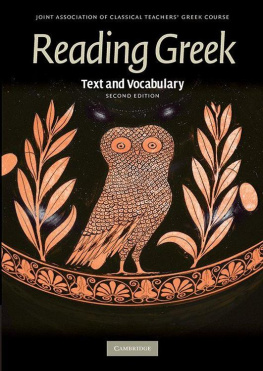
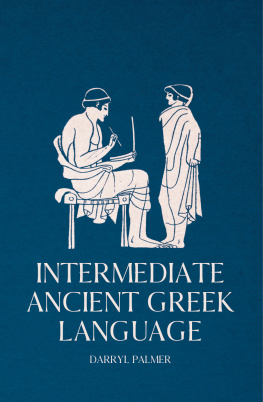
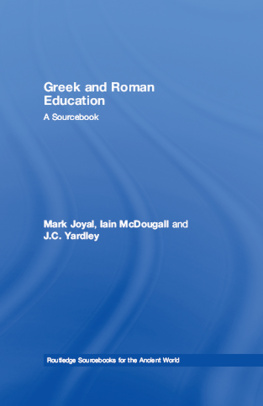

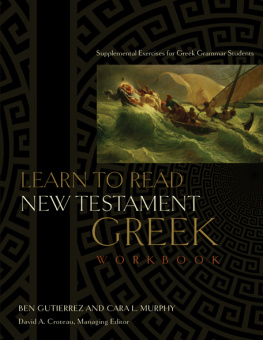
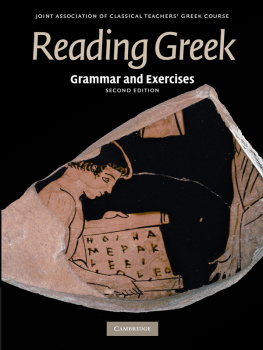
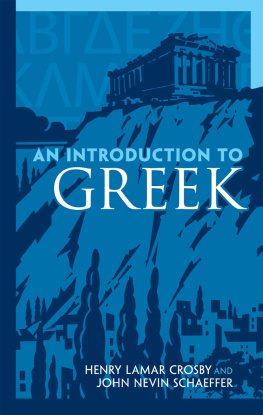
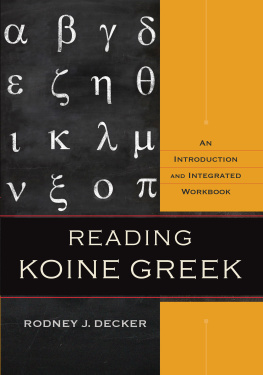
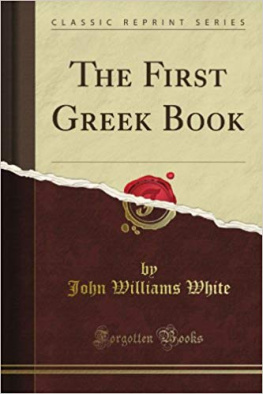
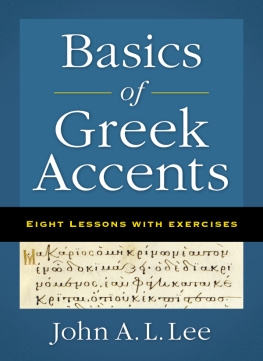
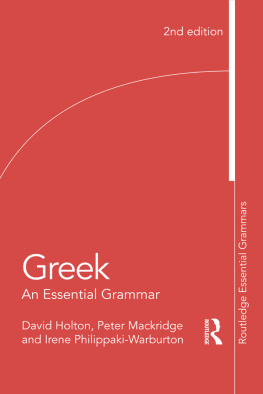
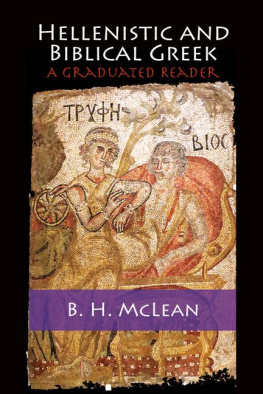

 CAMBRIDGE UNIVERSITY PRESS
CAMBRIDGE UNIVERSITY PRESS